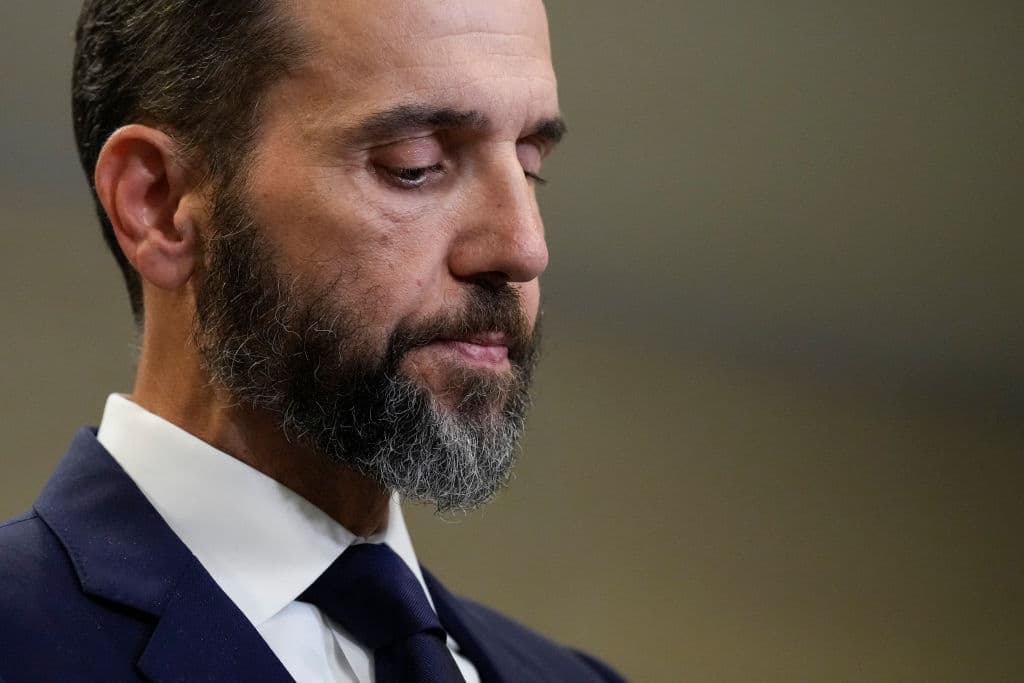Judge Cannon Strikes Jack Smith’s Mention of a Secret Map as Trump Readies a Motion To Dismiss
The jurist castigates the special counsel for employing a ‘speaking indictment’ that indulges ‘narrative,’ not just the facts.

Judge Aileen Cannon’s striking of one uncharged offense against President Trump is a symbolic victory for the 45th president and yet another setback for Special Counsel Jack Smith.
Trump on Monday also mounted an even more significant challenge to the case. If granted, it would be a knockout blow. He argues in a motion to dismiss that the “prosecution team violated President Trump’s due process rights by failing to keep the documents intact and in the same order as they were found during the raid” at Mar-a-Lago. Trump calls this by its technical name of “spoliation.”
The special counsel has admitted in court that the sequence of documents in some boxes is altered from the order in which they were originally discovered. He has also admitted to providing Judge Cannon with “inconsistent” explanations of the nature of the evidence. Mr. Smith, though, contends that the changes wrought to the evidence are so minor as not to infringe on due process rights.
While that claim has yet to be adjudicated, Judge Cannon on Monday ruled in Trump’s favor on a more granular point. She granted his request to strike one incident from the indictment — the episode where Trump allegedly showed a military map to a political adviser at his Bedminster estate.
The pertinent portion of the indictment alleges that Trump showed a Political Action Committee representative a “classified map of Country B … The PAC Representative did not have a security clearance or any need-to-know classified information about the military operation.” ABC news identifies the adviser as Susie Wiles and the country as Iran. She now advises his reelection campaign.
Judge Cannon demurred to strike from the indictment another episode, also at Bedminster, where Trump allegedly showed battle plans for Iran to his camarilla. The former president has been charged with possession of that second document. A recording of its display captured by a ghostwriter for Chief of Staff Mark Meadows discloses the 45th president reflecting that “as president I could have declassified it. Now, I can’t, you know.”
In ordering the matter of the map to be expunged from the indictment, Judge Cannon reminds Mr. Smith that the indictment “must be a plain, concise, and definite written statement of the essential facts constituting the offense charged.” She notes here the special counsel has opted for a “so-called ‘speaking indictment,’ including in the indictment various nonessential allegations more akin to a narrative about the government’s theory of prosecution.”
Judge Cannon worries that Mr. Smith’s indulgence of “narrative” could generate “prejudicial effects both for the grand jury and a potential jury.” Her edit is driven by a desire to prevent extraneous and uncharged facts from contributing to a “guilty” verdict. Her review of the indictment finds that “much of its language … is legally unnecessary to serve the function of an indictment.”
In pointed language that doubles as a rebuke to Mr. Smith, Judge Cannon warns of the “risks that can flow from a prosecutor’s decision to include in a charging document an extensive narrative account of his or her view of the facts, especially in cases of significant public interest.” She has already delayed the case indefinitely while this and other pre-trial matters are adjudicated.
Mr. Smith argued for including the map even though it does not serve as a basis for any of the 40 charges he handed up. He cites the Federal Rules of Civil Procedure. They mandate that evidence can be admitted to show a defendant’s “motive, opportunity, intent, preparation, plan, knowledge, identity, absence of mistake, or lack of accident.”
Judge Cannon, though, leaves open the door for Mr. Smith to argue for the inclusion of the map at a later date. For now, though, she is wary of admitting proof of Trump’s modus operandi until the “contours of defenses are crystallized and when the Court can assess the potential probative value and/or prejudicial impact of such evidence in light of the full evidentiary picture.”

